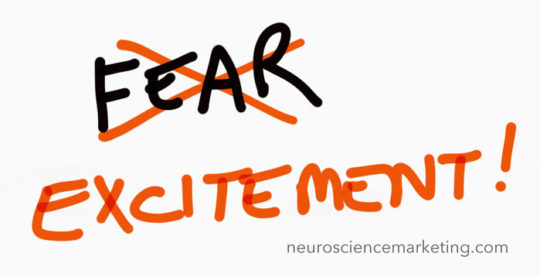7 Ways to Get Psyched & Ace Your Performance
Science shows that the right mental preparation has a huge impact

While few of us will take center stage at Carnegie Hall or step up to home plate at Yankee Stadium, we all have to perform at one time or another. Whether you are speaking to a packed auditorium or presenting to a small group of decision-makers, asking your boss for a raise or closing a sale, it’s a performance. And, being mentally prepared is a big part of delivering a great performance instead of a mediocre one.
When I spoke with McGinn recently, he explained that there are many small steps you can take to get your head in the game. “Many of these things that you can do are sort of very quiet, ritualistic practices that our research proves give you an edge,” he explained.
“Some of them involve a little bit of personal writing before you go do an event. Write about a time that made you feel powerful before you go into, say, a job interview. Studies show that will help you perform better in the interview.”
Here are seven research-proven ways to get psyched, taken from our podcast chat and Psyched Up:
1. Reappraisal – Relabel your feelings
You’ve no doubt felt that adrenaline rush before a big event: your heart beats faster and your breathing gets heavier. Anything from a speech to a large group to a musical performance can cause this reaction.
This physical state may be an indicator of anxiety or fear, but it doesn’t have to mean you are about to fail. Research has shown that it is how we interpret and respond to these sensations that makes the difference.
The strategy, according to Dan McGinn, is called reappraisal.

“Instead of trying to make that impossible leap between very nervous and very calm, reappraisal suggests that you should try to shift into an excitement mode,” he explained in our recent interview.
“You’re still going to be highly aroused, but it’s more positive. You’re focusing on the opportunity as opposed to what could go wrong. It’s a very subtle kind of shift, but there’s been a variety of studies that have suggested it can have a powerful influence on performance.”
Relabel your feelings from fear to excitement to get psyched for a performance. #speaking Share on X
2. Centering
Centering has its roots in Japanese martial arts and has been used by SWAT teams, Wall Street traders, professional musicians, and many others. It involves simple breathing and thought exercises that resemble meditation but, as taught by author Don Greene, can take less than 10 seconds. Centering can also include more engaging activities like yoga or meditation.
3. Pre-performance routines
Pre-performance routines are a series of thoughts or tasks that can be done before a performance. The activities, whether mental or physical, are the same every time, turning the process into a routine. Actors, for example, can use a dressing ritual that helps get them into character. Professional athletes often follow the same ritual before every game; in some cases, the ritual may be a group routine like the one in the video below.
Following a set ritual primes you for performance.
Create a pre-performance ritual and follow it exactly to ace your performance. #speaking Share on X
4. Performance contagion
Contagion doesn’t sound good – it reminds one of disease and germs. When bad products are put in a shopping cart next to good ones, they can “infect” the more desirable products via the cootie effect.
But, contagion can be a good thing when it is an association with a positive role model. A few years ago, I wrote about the Blackwing Pencil and speculated that by writing or drawing with the same pencil used by John Steinbeck and Frank Lloyd Wright, you might become more creative. It turns out there’s actually some science behind the theory.
 McGinn describes his own experiment with writing using “Malcolm Gladwell’s keyboard” in the book. Did his writing improve when he used the famous author’s keyboard? You’ll have to read Psyched Up to find out.
McGinn describes his own experiment with writing using “Malcolm Gladwell’s keyboard” in the book. Did his writing improve when he used the famous author’s keyboard? You’ll have to read Psyched Up to find out.
To invoke the contagion effect yourself, you can use (or perhaps carry or touch) something that is associated with a successful role model in your space. As magical as this sounds, the science says you may perform better.
5. Power poses
A 2012 study from Harvard Business School examined the benefit of “power posing,” the practice of adopting a powerful stance, particularly before a performance. These include postures like hands on hips with a wide stance.
Researchers examined speech quality and presentation quality of participants after they performed both high-power poses and low-power poses. “The high-power poses, in contrast to low-power poses, appeared to better maintain their composure, project more confidence, and present more captivating and enthusiastic speeches, in turn leading to higher overall performance evaluations,” the report stated.
One of the researchers, Amy Cuddy, gave a TED Talk about the concept that has been viewed tens of millions of times. While the findings of the original study have been called into question due to replication difficulties, I suspect there’s at least a placebo effect at work. If you believe that the pose makes you more confident and charismatic, it probably will.
6. Pep-talks
Sometimes, getting psyched up for a performance involves another person. Inspirational words from someone in authority, like a sports coach or sales manager, can create positive outcomes. Legendary pep talks like Knute Rockne’s “Win one for the Gipper” have been a staple in sports, but have a role in all kinds of performance. According to McGinn, research shows the best pep talks integrate direction or strategies with empathy and tie the task to some larger meaning, such as an organization’s long-term goals. Find someone to give you that talk before a performance, or help colleagues by giving them a pep talk. Do it for the Gipper!
Research: pep talks, if done right, actually do improve performance. #speaking #sports Share on X
7. Music
Science has long recognized that music can affect moods and emotions. Playing motivational music can help change your approach to a stressful activity. The rhythm, tempo and lyrics combined can help move a person into a more positive frame of mind.
You’ll have to find the music that works for you and your situation, but if you need a starting point, try Survivor’s Eye of the Tiger (from Rocky III). McGinn calls it “the most iconic psych-up song of all time.”
Get Psyched
We all experience anxiety, nervousness, or even fear when we are about to attempt something big or give an important performance. But, you can harness your out of control feelings. By using the tips and techniques from McGinn’s Psyched Up you can turn a stressful situation into a great performance.
Amazon: Psyched Up: How the Science of Mental Preparation Can Help You Succeed
7 Proven Ways to Get Psyched & Ace Your Performance. #Neuromarketing #speaking Share on X
